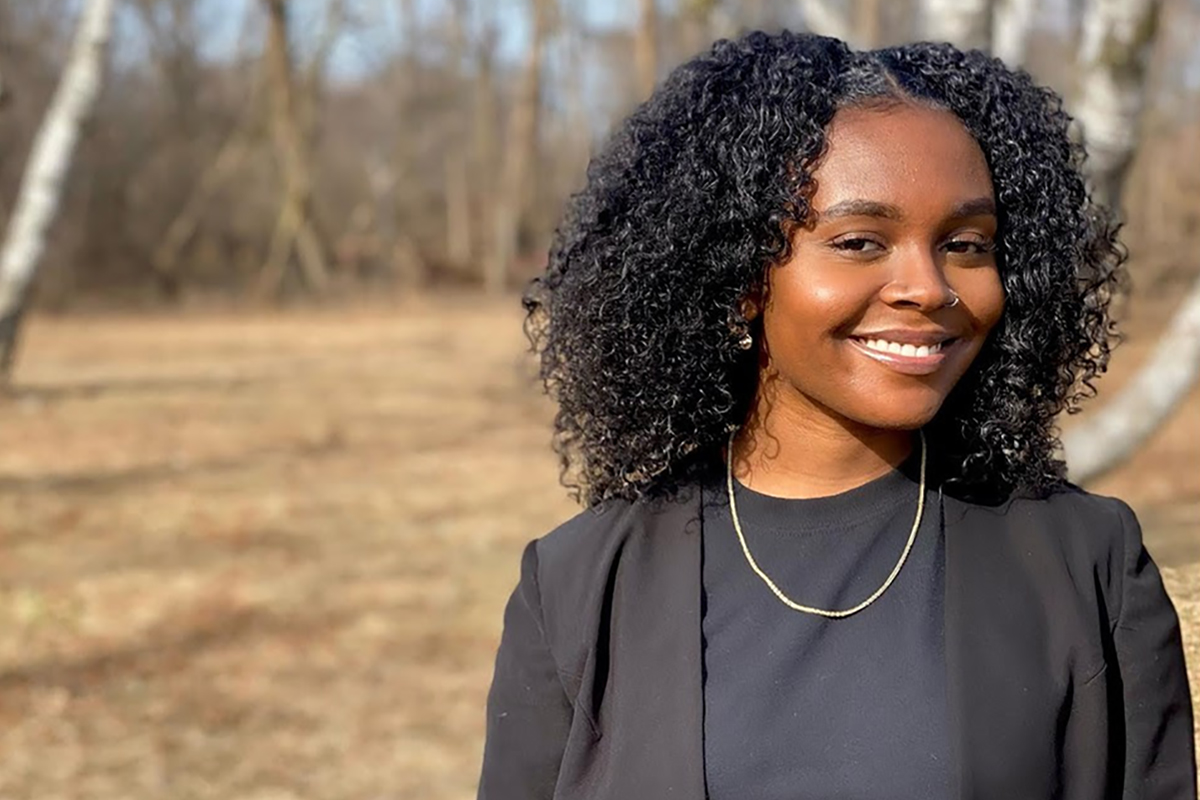Director John W. Smith announces deaccession of Head of a King (Oba) and plans to bring needed focus to Native American art and design via New Americas Research Initiative.
You Belong Here

“My job is to make sure the RISD Museum is a place where everyone feels like they belong,” says inaugural Social Equity and Inclusion Program Specialist Kajette Solomon. Since last October, Solomon has been overseeing the museum’s SEI efforts and helping to develop programs for staff members related to anti-racist pedagogy, teaching, research and interpretation of the collection. “My superpower is facilitating difficult conversations about race, racism and white privilege and what those concepts mean for cultural institutions like museums,” she adds.
“My superpower is facilitating difficult conversations about race, racism and white privilege and what those concepts mean for cultural institutions like museums.”
Solomon originally joined the museum’s education staff in 2016 and also serves on the board of the American Association of Museum Volunteers as the New England regional director. An art historian by training, she began to question the exclusive Western canon early in her career and posited as a student that traditional art museums could build on the foundations that culturally specific museums—like the Studio Museum in Harlem, where she interned in 2005—were already laying down.

In addition to creating this new role for Solomon, the museum has also recently hired Henry Luce Curatorial Fellow for Native American Art Sháńdíín Brown and Nancy Prophet Fellow Ahmari Benton, both of whom will support acquisitions and develop programming promoting historically underrepresented groups.
“We acknowledge the museum’s Eurocentricity and complicity in white supremacist culture and are actively working to redress our colonial foundations and bring anti-racist practice to all aspects of our work,” says Interim Director Sarah Ganz Blythe. “The goal is to deliberately, consistently and passionately confront racism and injustice in its many forms, including in the care and presentation of the collection.”

And although such commitments to positive, anti-racist change have ebbed and flowed over the years, Solomon is hopeful that the nationwide movement sparked by recent events will continue to gain momentum. “Calls for access, diversity, equity and inclusion are not new to cultural spaces,” she says, “but we’re making real progress here at RISD and there’s no going back.”

Benton, who is only a few months into her two-year fellowship, is also cautiously optimistic about the changes underway. She describes this as a “point in time where museums are reevaluating their history and indiscretions and thinking seriously about the way things were versus the way we want them to be.” Before joining the staff at RISD, Benton worked in larger institutions like the Whitney Museum of American Art and the Metropolitan Museum of Art (both in NYC), and she appreciates the “cozier” and less siloed atmosphere at the RISD Museum.
“We... are actively working to redress our colonial foundations and bring anti-racist practice to all aspects of our work.”
“I’m excited to work with such passionate people,” Benton says, “and it feels like the wheels are moving a little bit faster than they might at a larger institution.” As summer gets underway, she’s focusing on educational programs and contributing to partnerships with, for example, Providence’s Manton Avenue Project in which under-resourced youth write plays that are then acted out by professional actors. “We’re also getting great input from teens through local arts organization AS220 on how the RISD Museum can better engage younger and more diverse audiences,” she adds.

Brown is even newer to her role and still working remotely from Arizona. During her three-year fellowship, she’ll focus on Native North American objects in the museum’s collection, conducting provenance research and developing related programming and—most importantly—building a network of experts and tribal representatives to effectively highlight narratives and histories of Native American peoples in their own words and experience.
“Calls for access, diversity, equity and inclusion are not new to cultural spaces, but we’re making real progress here at RISD and there’s no going back.”
“We want to get the Narragansett community involved since RISD is situated on Narragansett tribal lands,” Brown says, “but our Indigenous objects come from all over the Americas, so we’ll be doing outreach as well.” Part of her job will be sifting through the museum’s collection to determine which pieces are ethically dubious based on the Native American Graves Protection and Repatriation Act (NAGPRA) and what to do with them. Most of the collection is ethical, she notes, but repatriating an object can be complicated if it doesn’t belong to a specific tribal organization.
Brown is looking forward to engaging with nearby tribal museums and collaborating with faculty members, including Adrienne Keene of the Cherokee Nation, who teaches Native American Studies at Brown University. “And, of course, we’re open to having RISD professors—Indigenous and non-Indigenous—make use of the collection in their teaching,” Brown adds. “There’s so much to be learned.”
—Simone Solondz
July 6, 2021


